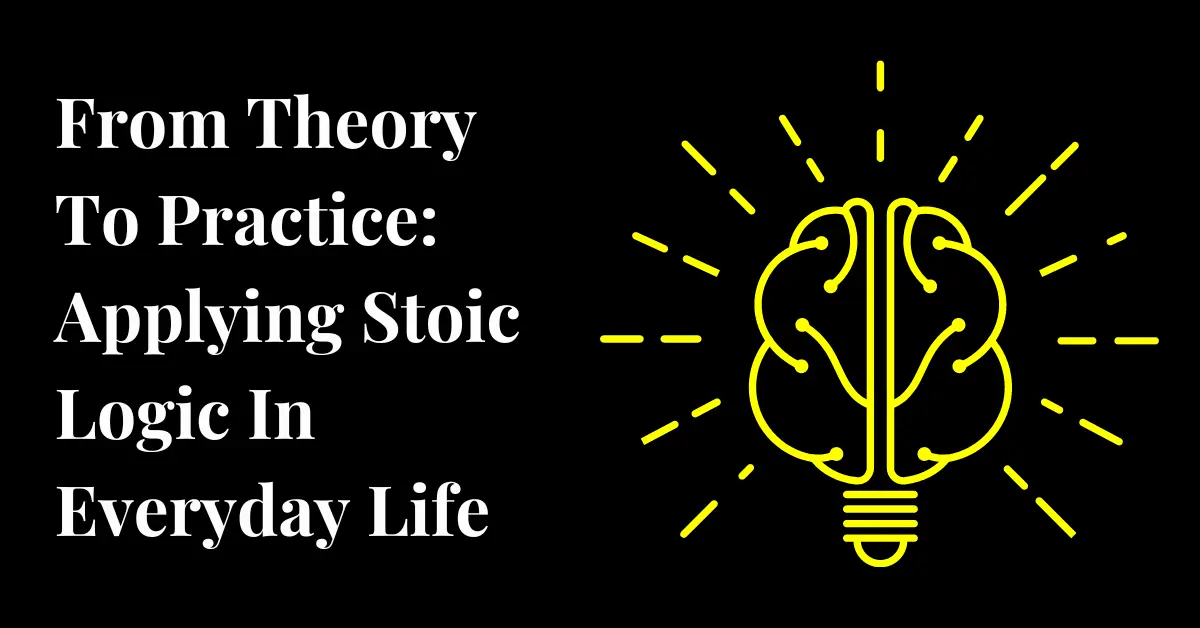Logic, one of Stoicism’s central tenets, involves the practice of reasoning and making sound arguments. In this post, we will explore the fundamentals of Stoic Logic, including the role of reason, the use of syllogisms, and the practice of dialectic, and how it can be applied to our everyday lives.
Table of Contents
The use of reason in Stoicism
Stoic Logic has several key components that are central to its practice, the first being the role of reason. Unlike other philosophical schools, which placed importance on emotions, intuition or divine revelation, Stoics believed that reason was the only reliable guide to truth and virtue.
Reason is a universal and objective faculty present in all human beings, and it allows individuals to understand the world and distinguish between right and wrong.
The Stoic view of reason is unique from other schools. For example, the Epicureans believed that pleasure was the ultimate goal of life and that reason was simply a means to achieve it.
The Platonists, on the other hand, believed that reason was a divine gift that allowed individuals to access the ‘eternal forms’ that underlie reality.
In contrast, the Stoics saw reason as a natural ability available to all human beings, regardless of their social status or background.
They argued that individuals who used reason to govern their actions would be free from the irrational passions and desires that often lead to vice and suffering.
Syllogisms in Stoic Logic
Syllogisms are a fundamental tool for structuring arguments and arriving at logical conclusions in Stoic Logic.
They are used to help individuals identify and analyze the assumptions and arguments underlying their beliefs and actions.
By breaking down complex arguments into their component parts, syllogisms allow individuals to evaluate the strength of the evidence and logic that support a particular position or belief.
For example:
- Premise 1: All humans are mortal.
- Premise 2: You are a human.
- Conclusion: Therefore, you are mortal.
This syllogism is an example of deductive reasoning, where the conclusion is necessarily true if the premises are true.
In this case, if we accept that all humans are mortal and that you are a human, then we must accept that you are also mortal. Stoics used syllogisms as a tool to help them reason through complex problems and come to logical conclusions.
Dialectic in Stoicism
In Stoicism, dialectic is a method of inquiry and discussion used to arrive at the truth and develop a deeper understanding of the world.
It involves a collaborative process of questioning and examining arguments and assumptions to arrive at a clearer understanding of the truth.
An example of dialectic in Stoicism would be two individuals discussing the nature of courage, one of the four Stoic virtues.
One person may argue that courage is an innate trait that some people are born with, while the other person may argue that courage is a virtue that can be learned and developed through practice.
Through the process of dialectic, the two individuals would explore the strengths and weaknesses of each other’s arguments and eventually arrive at a more nuanced understanding of courage.
Stoic logic in practice
This is not only a theoretical framework but also a practical tool that can be used in everyday life.
By applying it to real-life situations, we can develop critical thinking skills, make better choices, and ultimately live a more virtuous life.
One practical application is problem-solving. When faced with a problem or challenge, individuals can use Stoic Logic to break the problem down into smaller components, identify the underlying assumptions and beliefs, and then test those assumptions against reality. This process can help individuals arrive at a clearer understanding of the problem and develop more effective solutions.
For example, let’s say that you are struggling to maintain a healthy work-life balance. You can use Stoic Logic to:
- Break the problem down into smaller components, such as identifying the specific work tasks that are taking up too much time.
- Evaluating your priorities.
- Examining your beliefs about work and productivity.
By using these principles to test these assumptions against reality, you can identify areas where you may need to adjust your thinking or behavior in order to achieve a healthier balance.
Conclusion
Stoic Logic offers us a unique perspective on the role of reason and how it can be applied to our everyday lives. By placing reason at the forefront of their philosophy, the Stoics recognized the importance of critical thinking, logic, and inquiry in understanding the world and living a virtuous life.
Through the use of syllogisms and dialectic, individuals can develop their reasoning skills and arrive at a deeper understanding of complex problems. And by applying these principles to real-life situations, we can make better choices, solve problems more effectively, and ultimately live a more fulfilling life.
Additional reading

